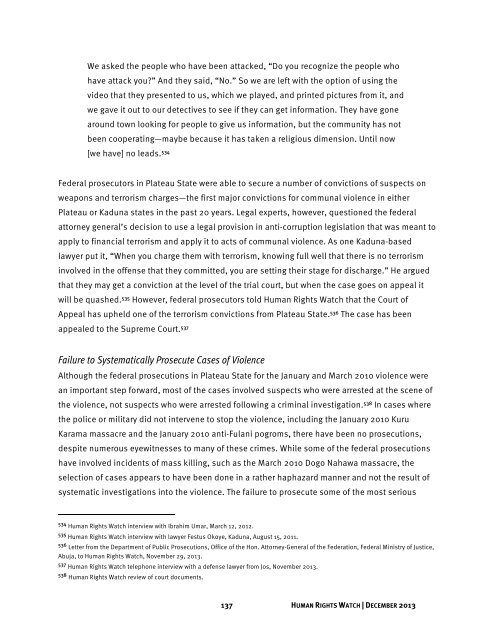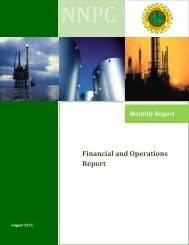You also want an ePaper? Increase the reach of your titles
YUMPU automatically turns print PDFs into web optimized ePapers that Google loves.
We asked the people who have been attacked, “Do you recognize the people who<br />
have attack you?” And they said, “No.” So we are left with the option of using the<br />
video that they presented to us, which we played, and printed pictures from it, and<br />
we gave it out to our detectives to see if they can get information. They have gone<br />
around town looking for people to give us information, but the community has not<br />
been cooperating—maybe because it has taken a religious dimension. Until now<br />
[we have] no leads. 534<br />
Federal prosecutors in Plateau State were able to secure a number of convictions of suspects on<br />
weapons and terrorism charges—the first major convictions for communal violence in either<br />
Plateau or Kaduna states in the past 20 years. Legal experts, however, questioned the federal<br />
attorney general’s decision to use a legal provision in anti-corruption legislation that was meant to<br />
apply to financial terrorism and apply it to acts of communal violence. As one Kaduna-based<br />
lawyer put it, “When you charge them with terrorism, knowing full well that there is no terrorism<br />
involved in the offense that they committed, you are setting their stage for discharge.” He argued<br />
that they may get a conviction at the level of the trial court, but when the case goes on appeal it<br />
will be quashed. 535 However, federal prosecutors told Human Rights Watch that the Court of<br />
Appeal has upheld one of the terrorism convictions from Plateau State. 536 The case has been<br />
appealed to the Supreme Court. 537<br />
Failure to Systematically Prosecute Cases of Violence<br />
Although the federal prosecutions in Plateau State for the January and March 2010 violence were<br />
an important step forward, most of the cases involved suspects who were arrested at the scene of<br />
the violence, not suspects who were arrested following a criminal investigation. 538 In cases where<br />
the police or military did not intervene to stop the violence, including the January 2010 Kuru<br />
Karama massacre and the January 2010 anti-Fulani pogroms, there have been no prosecutions,<br />
despite numerous eyewitnesses to many of these crimes. While some of the federal prosecutions<br />
have involved incidents of mass killing, such as the March 2010 Dogo Nahawa massacre, the<br />
selection of cases appears to have been done in a rather haphazard manner and not the result of<br />
systematic investigations into the violence. The failure to prosecute some of the most serious<br />
534 Human Rights Watch interview with Ibrahim Umar, March 12, 2012.<br />
535 Human Rights Watch interview with lawyer Festus Okoye, Kaduna, August 15, 2011.<br />
536 Letter from the Department of Public Prosecutions, Office of the Hon. Attorney-General of the Federation, Federal Ministry of Justice,<br />
Abuja, to Human Rights Watch, November 29, 2013.<br />
537 Human Rights Watch telephone interview with a defense lawyer from Jos, November 2013.<br />
538 Human Rights Watch review of court documents.<br />
137 HUMAN RIGHTS WATCH | DECEMBER 2013




